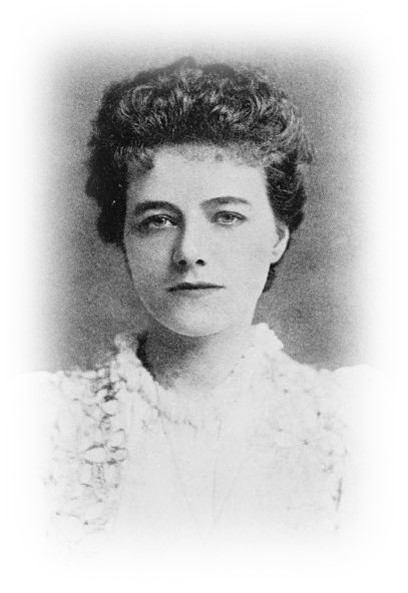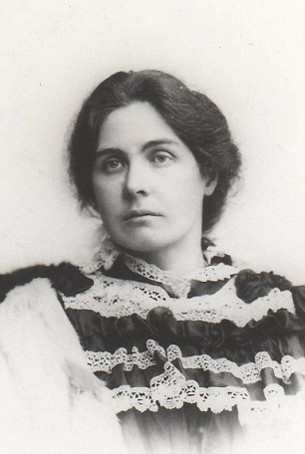Storia di una donna: Constance
Studio di un caso
| WHO WAS CONSTANCE LLOYD |  |
Constance Lloyd was a famous suffragette and she was also known as the wife of Oscar Wilde. Her relationship with her husband was difficult due to the fact that the writer was involved in an affair with a man; when the gossip started to spread all over the UK, she left the country for her children’s safety. After many years of travelling, she finally died in Genoa in 1898. The grave is formed by a celtic cross, which is 1.8 metres high (cross and base altogether) and is surrounded by four small columns.
It’s situated in Staglieno Cemetery, in the Protestant Side.
On the cross you can see a solemn epitaph: ”God shall wipe away all tears from their eyes.”
When she died, she was beloved, as shown by the flowers on her grave, and will always be remembered.
Nigro Margherita and Verrone Angelo
|
Mary Constance Lloyd Wilde
Constance Lloyd was born in Dublin in 1859; when she was fifteen her father died and her mother suffered from serious mental illness, so her childhood and teenage were very difficult to get through. When she was 21 her brother gave her the opportunity to leave Ireland and move to London to start a new life. Constance was a modern woman and she was cultivated, in fact she spoke several languages, such as French and Italian. She was also a suffragette who struggled for the franchise for women. She wrote for a magazine “The Woman’s World”, in which she tried to change women’s habits and fashion, so as to make female work in factories more accessible and less dangerous. She met Oscar Wilde, who was already a remarkable poet, at a reception in 1881 and it was love at first sight. After three years they got married and had two sons: Cyril and Vyvyan. In the meantime Oscar could not hide his homosexual inclination and had affairs with several men and then he met Lord Alfred Douglas, well known as Bosie, whom he started dating and with whom he had an affair. When Bosie’s father, the Marquess of Queensberry, who was a very violent, arrogant and old-fashioned man, found out about their relationship, he openly contrasted their love and a public trial was its consequence. It was a terrible scandal because both Constance and Oscar were very popular. At the end of the trial Oscar Wilde was proved guilty for his homosexuality, which was a crime in England in the Victorian Age, and was sentenced to two years of hard labour in Reading prison. This experience was devastating for him, although he was at least given the chance to write in his cell. His wife decided to go away from England: at first she went to her brother’s home in Switzerland and she changed her and her children’s name into Holland. After leaving her children in a boarding school in Switzerland she went to Liguria, in particular to Bogliasco and Nervi. Here she was given hospitality at Lady Margaret Brooke’s house, a close friend of hers. Constance visited her husband twice in prison; it was her who informed him of his mother’s death, which left him distraught. She promised him a large amount of money, provided he would not see his lover Lord Douglas again after leaving the prison. Actually Oscar Wilde could not resist temptation and met him again. In the meantime Constance’s health conditions worsened rapidly and she had to undergo several operations. She probably suffered from multiple sclerosis, but it was not diagnosed and after a surgery by the doctor Bossi, she died on the 7. Of April 1898. Oscar Wilde came to Genoa and paid a visit to her grave where he is said to have prayed and laid a large bunch of roses. Their children, whose surname remained Holland all through their lives, never met their parents again. Cyril died fighting in the first World War, while Vyvyan lived longer, became a writer and had a family. In 1963 the couple’s descendants decided to have “Wife of Oscar Wilde” carved on the tombstone, in Genoa’s cemetery.
|
|
Something else about Constance
Constance Lloyd Wilde in Liguria
Constance was the daughter of an Irish barrister, Horace Lloyd, and Adelaide Atkinson. She married Oscar Wilde in London on the 29. May 1884. She was a very independent, clever and modern woman who fought for the rights of women in the conservative and prudish society of Victorian England. Moreover she published a book based on children’s stories she had heard from her grandmother called “There was once”. The first years of her marriage were happy and rewarding as Oscar returned her love and affection and they shared ideas, social commitment and public life. They had two children and at first they were a happy and united family. It is unknown at what point Constance became aware of her husband’s homosexual relationships. In 1891 she met his lover, Lord Douglas, when Wilde brought him to their home for a visit. Around this time, Wilde was living more in hotels than at home. Since the birth of their second son, they had become sexually estranged. Nevertheless, by all accounts, she and Wilde remained on good terms. After Wilde’s imprisonment, Constance changed her and her sons’ last name to Holland to dissociate themselves from Wilde’s scandal. The couple never divorced and Constance visited Oscar in prison, so she could tell him the news of his mother’s death, which left Oscar distraught as he was very affectionate to his mother. Constance died on 7th April 1898, 2 days after a surgery. The immediate cause of death was likely severe paralytic ileus, but she probably suffered from multiple sclerosis, a disease which was little known at the time. She was buried in the monumental cemetery of Staglieno, Genoa, Italy. She did not want to be remembered as the wife of Oscar Wilde. However, almost one year after her death, the widower came to visit her in the cemetery and laid 100 roses on her grave. Some time later her and Oscar Wilde’s descendants reconciled and agreed to have her remembered as his wife. For this reason they had this phrase carved on her tombstone: “ wife of Oscar Wilde”.
A cura di Chiara Saglietti e Bianca Scardulla
Questo articolo è sotto la licenza Licenza Creative Commons Attribution Share Alike 4.0


